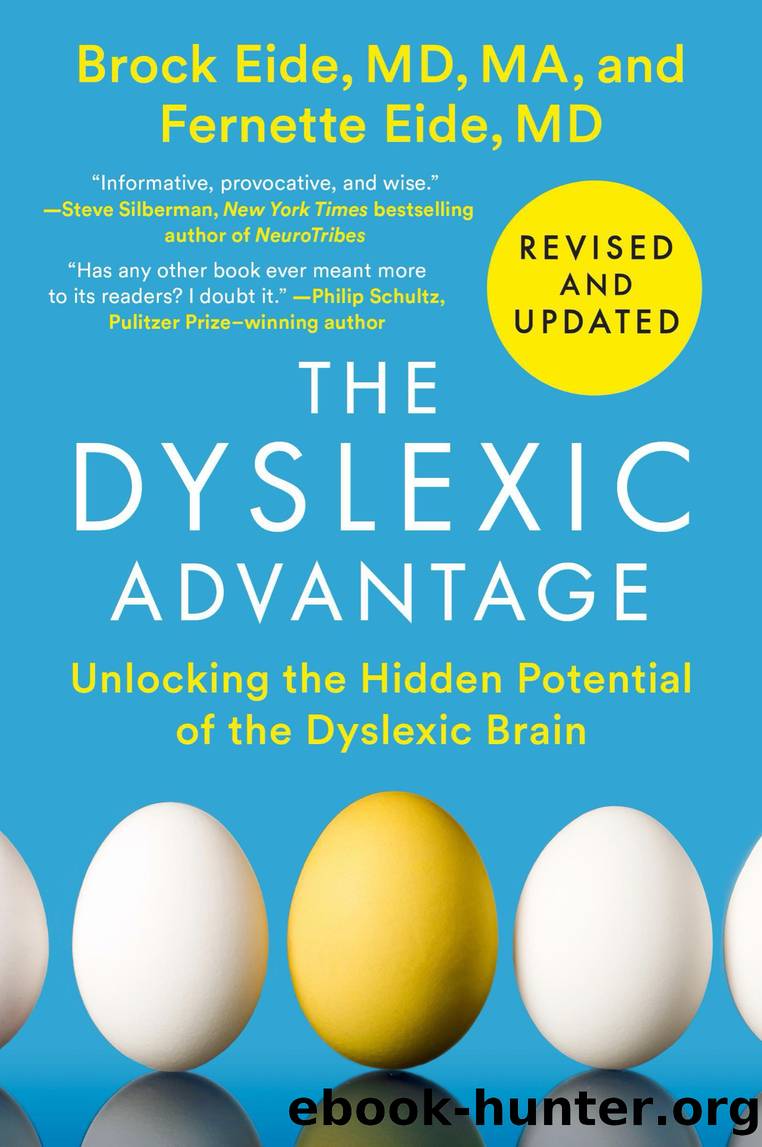The Dyslexic Advantage (Revised and Updated) by Brock L. Eide M.D. M.A. & Fernette F. Eide M.D

Author:Brock L. Eide M.D., M.A. & Fernette F. Eide M.D. [Eide, Brock L. & Eide, Fernette F.]
Language: eng
Format: epub
Publisher: Penguin Publishing Group
Published: 2023-02-14T00:00:00+00:00
N-Strengths in Action: Philip Schultz and Larry Banks
Letâs close this chapter by looking at the stories of two remarkable individuals. Both make their livings using narrative skills, and their lives display the many broad applications of N-strengths and of the episodic simulation system weâve just discussed.
* * *
â
When Philip Schultz was eleven, he had still not learned to read or write, so his school had him see a tutor. After several lessons the tutor asked Phil what he wanted to do with his life. Phil said that he wanted to become a writer. The tutor began to laugh. He laughed so hard his belly shook and tears came to his eyes. When he finally stopped guffawing, the tutor asked Phil, âWhy do you want to do something for the rest of your life that youâve found so hard to do on its most basic level?â Phil did not know how to answer him, but he knew what he wanted to do.
When that tutor looked at Phil, he saw only a boy who could not read, could not write, could not tell time from a clock, could not learn left from right, and could not understand and follow directions. But the tutor did not understand dyslexia. He did not understand that for many people with dyslexia, things most people find easy can be hard, and things most people find hard can sometimes be easy.
Philâs teachers did not understand dyslexia, either. They thought Phil was simply unable to learn. When they called on Phil in class, he stuttered badly and would sometimes become so anxious that he would just get up and leave the classroom. Phil was often placed in a corner and just left to himself, as if he werenât really part of the class. One time a teacher put a book in his hands and said, âHere, look at the pictures. Just sit there and pretend like youâre reading it.â
The other students often picked on Phil because of his problems learning. Since he could not respond in words, he often responded by fighting back. Twice he was expelled from school, and he was made to repeat third grade.
Philâs parents and grandmother supported him, but some of his cousins teased him. Phil was Jewish. As in many Jewish families, the children in Philâs family went to Hebrew classes to study the scriptures they would need to recite to become adult members of their community. Phil was completely unable to learn the texts. Phil loved the Jewish traditions, but his problems learning Hebrew only added to his shame. He could not bear to think that he was letting his whole community down.
Given all of his problems dealing with printed texts, why did Phil imagine that he could ever become a writer? The answer was simple. Phil loved stories, and he loved the idea of sharing stories with others.
Telling stories was a tradition in Philâs family. No one was a professional writer, but Philâs father and uncles were natural storytellers. They always tried
Download
This site does not store any files on its server. We only index and link to content provided by other sites. Please contact the content providers to delete copyright contents if any and email us, we'll remove relevant links or contents immediately.
Never by Ken Follett(2884)
Machine Learning at Scale with H2O by Gregory Keys | David Whiting(2293)
Fairy Tale by Stephen King(2071)
Fantastic Beasts and Where to Find Them: The Original Screenplay by J. K. Rowling(2045)
Will by Will Smith(2043)
The Storyteller by Dave Grohl(1662)
Cloud Cuckoo Land by Anthony Doerr(1435)
The Becoming by Nora Roberts(1331)
Friends, Lovers, and the Big Terrible Thing by Matthew Perry(1330)
New Morning Mercies: A Daily Gospel Devotional by Paul David Tripp(1325)
A Short History of War by Jeremy Black(1300)
HBR's 10 Must Reads 2022 by Harvard Business Review(1256)
Go Tell the Bees That I Am Gone by Diana Gabaldon(1236)
Cytonic by Brandon Sanderson(1229)
Can't Hurt Me: Master Your Mind and Defy the Odds - Clean Edition by David Goggins(1228)
The Complete Witcher by Andrzej Sapkowski(1226)
515945210 by Unknown(1209)
Fear No Evil by James Patterson(1110)
This Family Does It by Kevin Sellers(1080)
